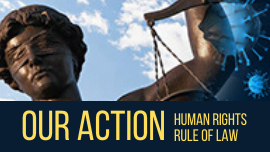The Law of Ukraine on the condemnation of the Communist and National Socialist (Nazi) regimes and prohibition of propaganda of their symbols pursues a legitimate aim, but is too broad in scope which can lead to obstructing free expression, preventing political parties from running in elections, and it introduces unfair sanctions that should be revised. These and other recommendations are part of a joint interim opinion by the Venice Commission and the OSCE/ODIHR adopted today.
The Venice Commission and OSCE/ODIHR recognise the right of Ukraine to ban or even criminalise the use of certain symbols of and propaganda for totalitarian regimes, but warn that in its current wording the law could obstruct the right to freedom of expression. The notion of propaganda must be “clearly defined” and should “imply something more than the mere expression of opinions and ideas,” they explain. The experts also point out the inconsistency of approaches to how the Communist and Nazi symbols lists are formed.
The experts note that the law contains quite “severe” and “disproportionate” sanctions. Only acts that pose an actual danger to society should entail criminal responsibility, according to the experts. “A mere display of a symbol or use of a name should not result in imprisonment”. The Venice Commission and OSCE/ODIHR call for a revision of the imposed sanctions.




